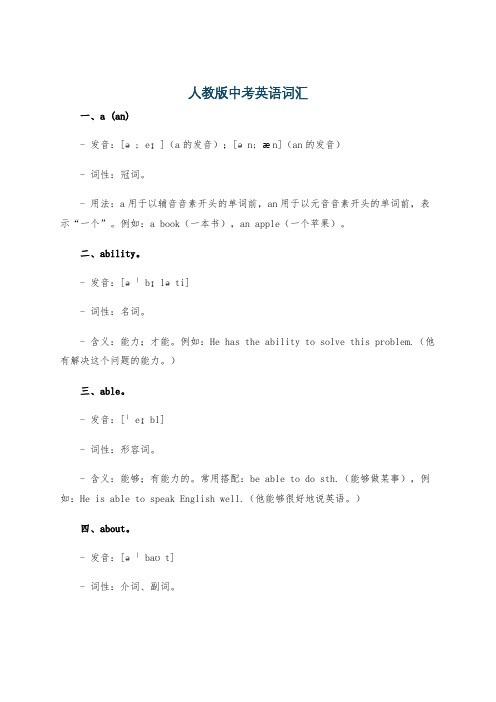英语词汇用法-able用法要点
able词根词缀

able词根词缀(最新版)目录1.ABLE 词根词缀的含义2.ABLE 词根词缀的来源和演变3.ABLE 词根词缀的用法和例子4.ABLE 词根词缀与其他词根词缀的比较5.ABLE 词根词缀在英语学习中的重要性正文一、ABLE 词根词缀的含义ABLE 词根词缀在英语中表示“能够、有能力”的意思,它来源于拉丁语的"abilis",意为“有能力的”。
在英语单词中,ABLE 词根词缀通常出现在单词的前面或者中间,用来修饰或者表示单词的含义。
二、ABLE 词根词缀的来源和演变ABLE 词根词缀最早来源于拉丁语,经过漫长的语言演变过程,逐渐形成了现代英语中的 ABLE 词根词缀。
在英语的发展过程中,ABLE 词根词缀经历了很多次的变化,但是其基本含义一直没有改变。
三、ABLE 词根词缀的用法和例子在英语中,ABLE 词根词缀通常用来构成形容词,表示“有能力的、能够的”。
例如:able(有能力的)、unable(没有能力的)、able-bodied (身体强壮的)等。
除此之外,ABLE 词根词缀还可以与其他词根词缀组合,形成更多的词汇。
例如:ability(能力)、inability(无能力)、ableism (能力主义)等。
四、ABLE 词根词缀与其他词根词缀的比较在英语中,除了 ABLE 词根词缀,还有很多其他的词根词缀,表示不同的含义。
例如:-ible(能够的)、-able(能够的)、-ant(……的)、-ful(充满……的)等。
这些词根词缀在英语中有着广泛的应用,它们与其他词根词缀的区别主要在于含义和用法。
五、ABLE 词根词缀在英语学习中的重要性ABLE 词根词缀在英语学习中具有重要意义。
掌握 ABLE 词根词缀,可以帮助学习者更好地理解和使用英语词汇,提高英语阅读和写作能力。
able相关单词

able相关单词摘要:一、引言1.介绍able 相关单词的背景和意义2.说明本篇文章的目的和结构二、able 相关的基本单词1.able2.ability3.disable4.disability5.unable三、able 相关的派生词1.unablely2.enable3.enabler4.disablement5.disabled四、able 相关的衍生词1.disablement2.disabling3.abilities4.inability5.enablement五、总结1.回顾文章中的able 相关单词2.强调able 单词在英语学习中的重要性正文:一、引言able 相关单词是英语学习中的重要词汇,涉及到能力、残疾、使能够等概念。
本文将详细介绍这些单词,旨在帮助读者更好地理解和运用这些词汇。
二、able 相关的基本单词1.able:形容词,表示有能力的、能干的。
如:an able leader(一位有能力的领导者)。
2.ability:名词,表示能力、才能。
如:intellectual ability(智力才能)。
3.disable:动词,表示使丧失能力、使不能。
如:disable a machine (使机器不能运转)。
4.disability:名词,表示残疾、功能障碍。
如:a physical disability(身体残疾)。
5.unable:形容词,表示不能的、无能力的。
如:unable to swim(不能游泳)。
三、able 相关的派生词1.unablely:副词,表示不能地、无能力地。
如:unablely express(无法表达)。
2.enable:动词,表示使能够、使成为可能。
如:enable a person to do something(使某人能够做某事)。
3.enabler:名词,表示使能者、助手。
如:a technological enabler(技术助手)。
able后缀的词语

able后缀的词语摘要:一、前言二、able 后缀的来源和意义三、able 后缀的词语举例四、总结正文:【前言】本文将详细介绍able 后缀的词语。
able 后缀在英语中非常常见,通常用来构成形容词,表示具有某种能力或特征。
【able 后缀的来源和意义】able 后缀源于拉丁语“abilis”,意为“有能力”或“有技能”。
在英语中,able 后缀通常用于构成形容词,表示某人或某物具有某种能力或特征。
例如:- capable(有能力的,能干的)- adaptable(适应性强的)- reliable(可靠的)【able 后缀的词语举例】以下是一些常见的able 后缀的词语:1.capable:表示有能力的,能干的。
例如:- He is a capable leader.(他是一个有能力领导人。
)2.adaptable:表示适应性强的。
例如:- The software is adaptable to different operating systems.(该软件适用于不同的操作系统。
)3.reliable:表示可靠的。
例如:- His reports are always reliable.(他的报告总是可靠的。
)4.flexible:表示灵活的,可调整的。
例如:- The company"s working hours are flexible.(公司的工作时间很灵活。
)5.ovable:表示可移动的,可去除的。
例如:- The bookshelf is movable.(书架是可以移动的。
)【总结】able 后缀在英语中非常常见,用于构成形容词,表示具有某种能力或特征。
高中词汇用法

1. able 用法:be able to doNote: 反义词unable表示不能,而disabled表示残疾的。
be able to do可以表示经过艰难困苦才能做到的事。
2. abroad 用法:表示到(在)国外,是一个副词,前面不加介词。
Note: 可以说from abroad, 表示从国外回来。
3. admit 用法:表示承认的时候后面要加上动名词形式。
Note: 表示允许进入的时候与介词to搭配。
4. advise 用法:advise sb. to do; advise doingNote: 后面的宾语从句要用虚拟语气。
即:advise that sb. (should) do的形式。
5. afford 用法:通常与动词不定式搭配使用。
Note: 前面需要有be able to或can等词。
6. after 用法:表示在时间、空间之后;be after表示追寻。
Note: 用在将来时的时候后面接一时间点,而in接一个时间段,如:after 3 o’clock; in 3 days.7. agree 用法:与介词on, to, with及动词不定式搭配。
Note: agree on表示达成一致;agree to表示批准;agree with表示同意某人说的话。
8. alive 用法:表语性形容词,在句中只能作表语,不能作定语。
Note: 可以作状语使用,表示活活地,如:bury alive.9. allow 用法:allow doing; allow sb. to doNote: 可以表示允许进入,如:Please allow me in.10. among 用法:用在三者或三者以上的群体中。
Note: 还可以表示其中之一,如:He is among the best.11. and 用法:用于连接两个词、短语、句子或其他相同结构。
Note: 与祈使句搭配时往往可以表示条件。
如:Work hard, you’ll succeed sooner or later.12. another 用法:表示又一个,泛指,相当于one more的含义。
英语词汇用法-able用法要点

英语词汇用法-able用法要点1. 表示“有水平的”、“能干的”,可用作表语或定语。
如:He is an able manager. 他是位有水平的经理。
He is old but still able. 他虽年老,但仍有很能干。
2. 用于 be able to do sth(能或会做做某事)。
如:He is able to speak English. 他会说英语。
Everyone here is able to type. 这儿的每一个人都会打字。
He will be able to get about in a week or two. 再过一两个星期左右他就能走动了。
He studied hard and was able to pass his examinations. 他学习很努力,所以考试及了格。
注:be able to 不但有多种时态形式(通常不用于实行时或与 be going to 连用),而且还能够与某些情态动词连用(通常不与 can 连用),甚至还能够有非谓语形式。
如:Since his accident h e hasn’t been able to leave the house. 自出事之后,他一直未能离开家。
You might be able to persuade him. 你也许能够说服他。
I hope to be able to do the work. 我希望能干得了这项工作。
I regret not being able to help her. 我很遗憾未能协助她。
3. able 的比较级和级通常是 abler 和 ablest,也能够是 more able 和 most able,有时还可用 better able和best able。
如:You are better able to do it than I (am). 你比我更有水平做这件事。
She’s the person best able to cope. 她是个最能妥善处理问题的人。
able后缀的词语

able后缀的词语【最新版】目录1.介绍 able 后缀的含义和用法2.分析 able 后缀在英语单词中的应用3.举例说明 able 后缀对词义的影响4.总结 able 后缀的重要性和实用价值正文在英语中,词尾后缀扮演着非常重要的角色,它们可以改变单词的词性、词义和语态。
其中,able 后缀是一个非常常见的后缀,它主要用于构成形容词,表示某种能力或特征。
本文将详细介绍 able 后缀的含义和用法,并通过实例分析 able 后缀在英语单词中的应用,以及它对词义的影响。
首先,able 后缀源自于拉丁语的-abilis,意为“能够”或“具有”。
在英语中,它能够赋予一个单词以某种能力或特征的含义。
例如,单词"able"(有能力的)和"unable"(没有能力的)就是通过添加或去掉 able 后缀来表示能力的有无。
此外,我们还可以通过在 able 后缀前添加不同的前缀,来构建具有不同含义的词语,如"enable"(使能够)、"disable"(使不能)等。
其次,able 后缀在英语单词中的应用非常广泛。
举几个例子来说明:1."reable"(重新能够):这个词汇通过在 able 后缀前添加"re-"前缀,表示恢复某种能力。
2."able-bodied"(身体健康的):这个词汇通过在 able 后缀后添加"bodied"(身体的),表示一个人身体健康的状态。
3."able-minded"(思维敏捷的):这个词汇通过在 able 后缀后添加"minded"(头脑的),表示一个人思维敏捷的特质。
再次,able 后缀对词义的影响也是非常明显的。
它能够将一个单词从名词转变为形容词,表示某种能力或特征。
例如,单词"power"(力量)通过添加 able 后缀变为"powerful"(强大的),表示某人或某物具有强大的力量。
人教版中考英语词汇

人教版中考英语词汇一、a (an)- 发音:[ə; eɪ](a的发音);[ən; æn](an的发音)- 词性:冠词。
- 用法:a用于以辅音音素开头的单词前,an用于以元音音素开头的单词前,表示“一个”。
例如:a book(一本书),an apple(一个苹果)。
二、ability。
- 发音:[əˈbɪləti]- 词性:名词。
- 含义:能力;才能。
例如:He has the ability to solve this problem.(他有解决这个问题的能力。
)三、able。
- 发音:[ˈeɪbl]- 词性:形容词。
- 含义:能够;有能力的。
常用搭配:be able to do sth.(能够做某事),例如:He is able to speak English well.(他能够很好地说英语。
)四、about。
- 发音:[əˈbaʊt]- 词性:介词、副词。
- 介词含义:关于;大约。
例如:a book about history(一本关于历史的书),It's about 5 o'clock.(大约五点钟。
)- 副词含义:大约;到处;四处。
例如:walk about(四处走动)。
五、above。
- 发音:[əˈbʌv]- 词性:介词、副词、形容词。
- 介词含义:在……上面(表示位置高于某物,但不一定垂直)。
例如:The picture is above the desk.(这幅画在桌子上方。
)- 副词含义:在(或向)上面;在(或向)较高处。
例如:Look above!(往上看!)- 形容词含义:上述的。
例如:the above statement(上述声明)。
able的所有形式及用法

able的所有形式及用法able是一个常用的英文单词,意为能够的、有能力的。
它常常用于各种场合中,包括口语和书面语。
在本文中,我们将会分步骤地介绍able的所有形式及用法。
一、able作为形容词1. able作为形容词,表示有能力或有可能的。
例如:- She is able to speak three languages fluently.- He is able to finish his work on time.- It is able to snow in this area during winter.2. able可以用来形容人或人的品质,如:- He is a responsible and able manager.- She is a talented and able musician.- The students in this school are able and hardworking.3. 在句中,able也可以用来表示某一事物所能承受或具备的能力或特质,如:- This car is able to carry six passengers.- This material is able to resist high temperatures.- This company is able to provide excellent customer service.二、able作为动词1. able还可以用作主动语态的动词,意为使能、使得能。
常常与to一起搭配使用,如:- These exercises will able you to lose weight.- This training course will able you to improve your communication skills.2. 另外,able也可以用作被动语态的动词,表示有能力、有才干,如:- He is able to play the guitar.- She is able to write excellent poems.三、able的形式变化1. 形容词able的比较级为abler,最高级为ablest。
- 1、下载文档前请自行甄别文档内容的完整性,平台不提供额外的编辑、内容补充、找答案等附加服务。
- 2、"仅部分预览"的文档,不可在线预览部分如存在完整性等问题,可反馈申请退款(可完整预览的文档不适用该条件!)。
- 3、如文档侵犯您的权益,请联系客服反馈,我们会尽快为您处理(人工客服工作时间:9:00-18:30)。
英语词汇用法-able用法要点
1. 表示“有水平的”、“能干的”,可用作表语或定语。
如:
He is an able manager. 他是位有水平的经理。
He is old but still able. 他虽年老,但仍有很能干。
2. 用于 be able to do sth(能或会做做某事)。
如:
He is able to speak English. 他会说英语。
Everyone here is able to type. 这儿的每一个人都会打字。
He will be able to get about in a week or two. 再过一两个
星期左右他就能走动了。
He studied hard and was able to pass his examinations. 他
学习很努力,所以考试及了格。
注:be able to 不但有多种时态形式(通常不用于实行时或与 be going to 连用),而且还能够与某些情态动词连用(通常不与 can 连用),甚至还能够有非谓语形式。
如:
Since his accident h e hasn’t been able to leave the house. 自出事之后,他一直未能离开家。
You might be able to persuade him. 你也许能够说服他。
I hope to be able to do the work. 我希望能干得了这项工作。
I regret not being able to help her. 我很遗憾未能协助她。
3. able 的比较级和级通常是 abler 和 ablest,也能够是 more able 和 most able,有时还可用 better able和best able。
如:
You are better able to do it than I (am). 你比我更有水平
做这件事。
She’s the person best able to cope. 她是个最能妥善处理问
题的人。
4. 若要增强语气,其前除可very, quite, perfectly等修饰外,有时还可用well修饰。
如:
He is quite [well] able to take care of himself. 他完全有
水平照顾自己。
He’s a very able student; he’s just too lazy. 他是个很
有水平的学生,仅仅太懒了。
若受just, only just修饰,则表示“只能”“仅能”。
如:
I was just able to make out a dark figure in the distance. 我只能看见远处有个黑影。
5. able的反义词是unable(不能的,不会的),不是disable,后者是动词,其意为“使残废”“使无水平”。
比较:
They were unable to reach a decision. 他们没法做出决定。
Now that he was disabled, his house had become a prison
to him. 因为他残废了,他的房子就成了他的牢笼。
